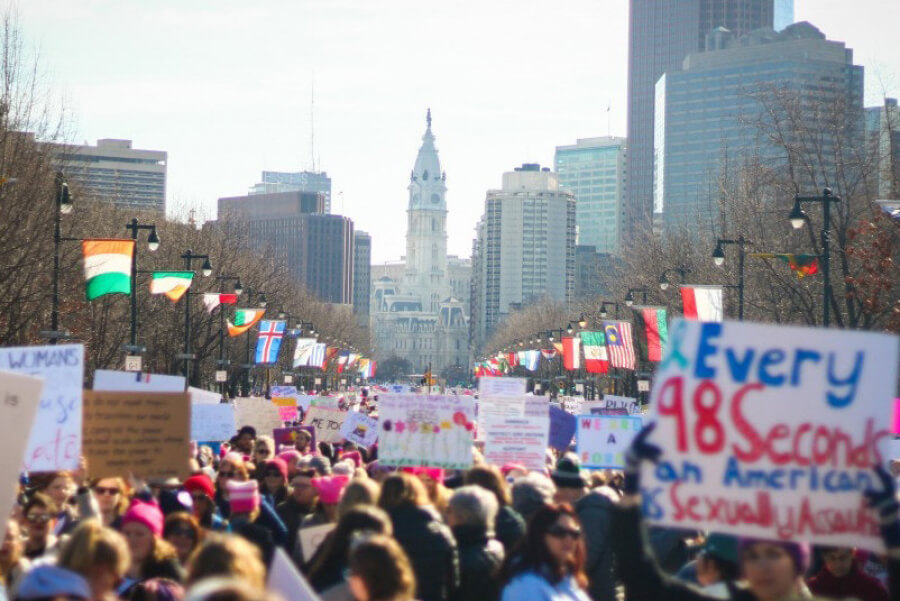As practitioners of cohesive workspaces, we at Catalytics strive to help each professional environment we enter become a more healthy, welcoming and productive place. One thing we take very seriously is sexual harassment in the workplace.
Workplace sexual harassment is defined by the U.S. Equal Opportunity Employment Commission (EEOC) as unwelcome sexual advances, requests for sexual favors, and other verbal or physical conduct of a sexual nature which explicitly or implicitly affects an individual’s employment, unreasonably interferes with an individual’s work performance, or creates an intimidating, hostile, or offensive work environment.
We firmly believe sexual abuse/violence is never acceptable behavior, and it holds no place in the professional world—and we go out of our way to eradicate this behavior when we come across it, both in our line of work and in our own personal lives. On January 18, 2019, our Co-Founder and Managing Partner Kim Carter attended the Women’s March on Philadelphia to continue the fight against sexual violence.
“Some women march for poverty, while others march to protect children from gun violence. Other women march for decreasing the wage gap, environmental justice, equality for all, and even justice or migrant reforms. In 2019, I marched for the #MeToo movement,” Carter says.
This was her second time marching arm-in-arm with the remarkable men and women of the Women’s March on the streets of Philadelphia, having marched in 2017 as well. Through the frigid January afternoon, she walked with purpose and hope. As a survivor of sexual harassment in the workplace who has recently come forward with her own experiences of abuse, the #MeToo movement resonates with Carter on a personal level.
“While the Women’s March is not the #MeToo movement specifically, I believe they’re compatible in that they both empower women. One issue that, once addressed, will propel both movements forward is addressing toxic masculinity,” Carter explains. “As much as we need confident, capable and competent women, we also need emotionally strong men.”
Fortunately, the Women’s March creates a space where people of all genders and walks of life can come together to lift each other up and be heard.
“Knowing there are strong men out there who recognize the struggles of women is a comfort. The best part of the Women’s March is the camaraderie and solidarity of supporting women,” Carter says. “Personally, I love seeing thousands of women come together to support, uplift and celebrate each other.”
As a feminist movement, the Women’s Marches have been met with some pushback by those who don’t understand their purpose.
“The general population often misinterprets the goals of modern feminism, yet it is simply the idea that women are as deserving of opportunities as men. Period. … That being said, inclusive feminism is the feminism of 2019.”
In this era of fourth-wave feminism, intersectionality and inclusivity are incredibly important in feminist movements like the Women’s Marches and #MeToo.
“Feminism is knowing that while the white woman may make 77 cents to the man’s dollar, black women make 60 cents per dollar and Hispanic women make only 54 cents on the dollar,” Carter explains. “Feminism is the social, political and economic equality of the sexes, which in 2019 includes transgender, gender binary and any other gender identifications.”
She then went on to describe some additional feminist social issues that she feels deserve attention, including women’s agency over their bodies when it comes to reproductive rights, the rights of muslim and middle eastern women to wear the religious garments they are comfortable with, and the suicide rates of transgender individuals.
“Some debate whether or not we even need feminism, but I urge you to self-diagnose. … Look to your mother, your sister, your aunt or your daughter. Ignorance is bliss… but only for those who are unaffected,” Carter says.
She shared some of her wishes for the future of the Women’s Marches: “I hope the women’s marches continue for a very long time,” she says, aptly pointing out that “the suffragettes stopped marching once women obtained the right to vote, yet there were still significant inequalities that existed at that time and continue even today.”
Overall, the 2019 Women’s March on Philadelphia was an encouraging and invigorating experience for Carter, and it surely won’t be her last.
“I love seeing young women march loud and proud—it gives me hope for the future,”
Carter offers this parting advice for the generations of young women yet to come: “Don’t sit back and take progress for granted. Remain active in your communities both at work and at home. Take a stand for yourself, but more importantly, take a stand for others.”

